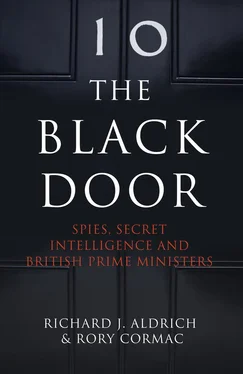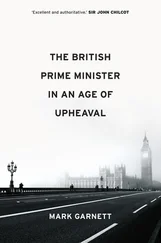Asquith had been notably detached from the business of war. He may have presided over the creation of the Secret Service Bureau and the rapid expansion of every kind of intelligence after 1914, but it had interested him very little. By contrast, in December 1916, David Lloyd George became the first prime minister to embrace intelligence, albeit often in an amateurish manner. This was partly to do with his nature, for he was by temperament a man of enormous energy and sudden impulses. But his initial mistakes also reflected the fact that British intelligence lacked a central brain. No system existed for sifting and interpreting intelligence for top policymakers. Despite a quantum leap in the organisation of Downing Street, and the creation of the Cabinet Office in late 1916, intelligence was deliberately left out. As a result, Lloyd George lacked context and made emotional responses to the raw intelligence he received – with unhappy results.57
His previous interactions with intelligence had been in the context of the ongoing spy-mania. In May 1915, as minister of munitions, he sought to confront the problem of factory explosions. Such disasters were almost invariably the result of primitive manufacturing processes, running at maximum capacity, which did not privilege safety. Like many others, however, Lloyd George was obsessed with the danger of the German ‘hidden hand’, and blamed saboteurs. His staff were allowed to set up a counter-intelligence unit to ferret out these imaginary enemies. Given the name P.M.S.2, it failed to find any spies, and slowly shifted its attention to trade union activity in the munitions factories.58
Lloyd George later admitted that he and some of his friends had deliberately encouraged rumours of saboteurs within the British munitions programme. This included the vast shell-filling factory at Chilwell on the banks of the River Trent in Nottingham, the largest concentration of high explosives anywhere in Britain. In January 1916, a Zeppelin was reported to be hunting up and down the Trent, supposedly hoping to bomb the factory. The next day, rumours circulated that Lloyd George’s friend Lord Chetwynd, who ran the huge complex, had caught three German spies in the act of trying to guide the Zeppelin to its target with hand-held torches and had shot them. Chetwynd exploited the false rumour by asking a labourer to dig three graves on the hillside by night, placing an anonymous black post at the head of each. This, recalled Lloyd George, ‘turned the rumour into unquestioned history’ and discouraged the curious from prying around the factory. Predictably, when it suffered a catastrophic explosion later in the war, it was blamed on yet more spies.59
In late 1916, shortly before Lloyd George became prime minister, the Germans asked the American ambassador in Berlin to explain to President Woodrow Wilson that they were ‘anxious to make peace’. But they did not wish to appear weak, so they secretly asked the United States, which was then neutral, to make a ‘spontaneous’ offer of mediation. Unfortunately for Germany, Britain’s Room 40 had decrypted the American message. When Lloyd George read it, he wrongly assumed that it signified collaboration between America and Germany. With the cabinet in disarray, and lacking intelligence-assessment machinery, the impulsive Lloyd George decided to act alone. He warned the American press against interference by Washington, and asserted that the war must be a ‘fight to the finish’. In reality, President Wilson was immersed in an election campaign and had no interest in peace initiatives at this point. Either way, diplomacy was not Lloyd George’s responsibility. When rebuked by the foreign secretary for meddling, he used the decrypts to defend himself. Far worse, he also alluded to secret information when explaining his actions in Parliament. Even as he assumed office in Downing Street in December 1916, more decrypts crossed his desk which he wrongly – and amateurishly – assumed suggested that the Kaiser and Wilson were still working together. This was not an auspicious beginning, and pointed to a wider failure around the assessment of intelligence at the centre of government.60
Lloyd George brought his undoubted talents for planning and organisation to the highest level of government. The most important part of this reform was the creation of a professional secretariat by Maurice Hankey, a former Royal Marine officer who became the first cabinet secretary. His background was in intelligence – as a junior officer assigned to HMS Ramillies , the flagship of the Mediterranean Fleet, he had engaged in unofficial reconnaissance. By 1902, he had joined the staff of the Naval Intelligence Department in Whitehall. An outstanding officer who spoke many languages, he was the perfect administrator. In 1909, he had written a report for the Committee of Imperial Defence that proposed a Secret Service Bureau.61 Now, in the newly created Cabinet Office, he was joined by Thomas Jones. Once described as ‘a disguised Bolshevik whom Lloyd George had discovered somewhere in a Welsh coal pit’, Jones was nevertheless an equally formidable organiser. It is difficult to capture the chaos that surrounded cabinet affairs before their arrival, and it is no exaggeration to say that they invented modern cabinet government.62
Hankey’s reforms were a triumph. They became central to the development of a modern British interdepartmental coordination system, with its labyrinthine sub-committees and orderly minutes focused on Downing Street. Cabinet meetings were no longer rambling conversations amongst twenty-three people, with no agenda. Instead, they became businesslike discussions at which decisions were made and properly recorded. Yet the reforms were a tragedy for secret service. Hankey created a central mechanism for everything except intelligence. Jones, his deputy, recalled that he had been insistent that the new Cabinet Secretariat should not become ‘an Intelligence department’,63 and although the design of the war cabinet at first envisaged ‘a comprehensive and regular gathering of intelligence’, this never happened.64 The lack of a central clearing house for assessing intelligence had been a constant criticism of government for some time, so while Hankey is celebrated as a moderniser of the government machine, he simultaneously retarded the British intelligence community by twenty years. The idea of a central intelligence machine located alongside Downing Street had to await a further world war, and the arrival of Winston Churchill as premier.65
Lloyd George’s personal record as a user of decrypts did not improve during the war. He was often left to deduce the story from individual intercepts, or ‘flimsies’ as they were called, because of the thin paper on which they were recorded, that arrived without context or comment. He was also given little guidance on the need for security. Thus in February 1917, when the American ambassador, Walter Page, visited Downing Street to convey a message from President Wilson, the prime minister could not restrain himself. He boasted that he had already seen Wilson’s message, attributing this to a leak. Page thought it possible that the telegram had been obtained by a ‘British spy service’ from an unreliable American official. In any case, knowing Wilson’s hatred of leaks, he did not inform Washington. Indeed, the president was obsessively secretive, and actually insisted on deciphering his more sensitive telegrams himself, sometimes with the help of his wife. The realisation that Lloyd George was reading his every word would not have endeared London to him.66
Surprisingly, even as Lloyd George put their work in peril, British codebreakers delivered the greatest intelligence coup of the First World War. They had intercepted what would soon become famous as the ‘Zimmermann telegram’. In this amazing message, Germany’s foreign minister, Arthur Zimmermann, promised Mexico the reward of three of America’s southern states if she joined the German cause and declared war on her northern neighbour, the US. The message was one of the most secret of the war, and was supposed to have been taken by safe hand on a German submarine. But the vessel broke down before leaving port, forcing Berlin to trust the safety of its ciphers.
Читать дальше












